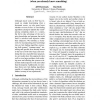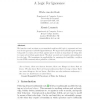171 search results - page 3 / 35 » Logical omniscience and common knowledge: WHAT do we know an... |
CHI
2010
ACM
14 years 2 months ago
2010
ACM
When experts participate in collaborative systems, tension may arise between them and novice contributors. In particular, when experts perceive novices as a bother or a threat, th...
CHI
1993
ACM
13 years 11 months ago
1993
ACM
In order to inform the design of technology support and new procedural methodsfor softwaredesign,we analyzed the content of real design meetingsin threeorganizations, focusing in ...
COLING
2010
13 years 2 months ago
2010
Although much work in NLP has focused on simply determining what a document means, we also must know whether or not to believe it. Fact-finding algorithms attempt to identify the ...
DALT
2003
Springer
14 years 23 days ago
2003
Springer
We introduce and motivate a non-standard multi-modal logic to represent and reason about ignorance in Multi-Agent Systems. We argue that in Multi-agent systems being able to reaso...
SIGUCCS
2003
ACM
14 years 23 days ago
2003
ACM
Working on a small campus has many advantages: Familiarity with the majority of faculty and staff, in-depth knowledge of how systems interact, adding the personal touch to each in...


